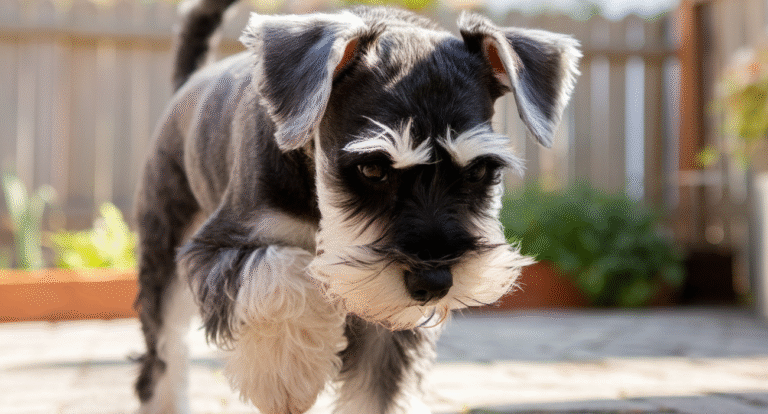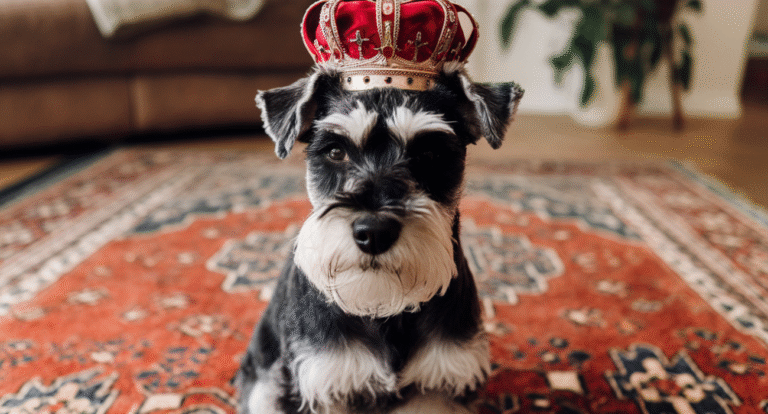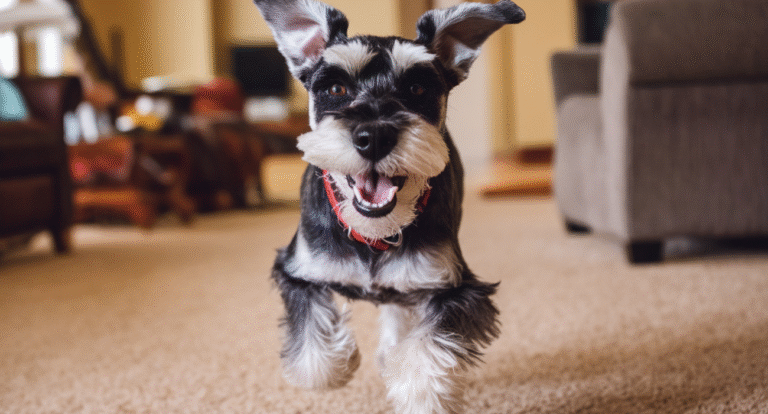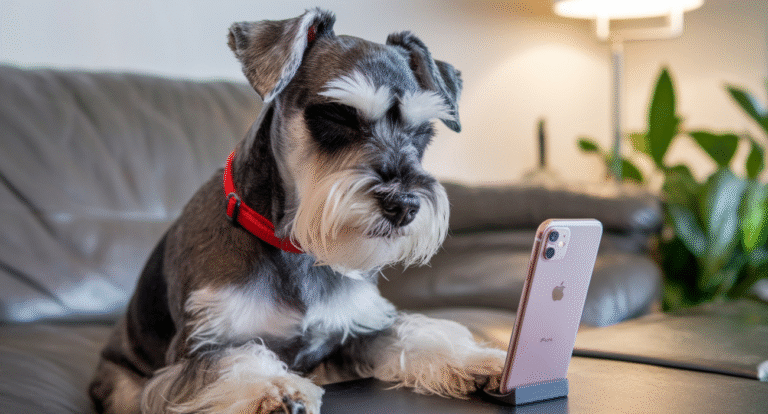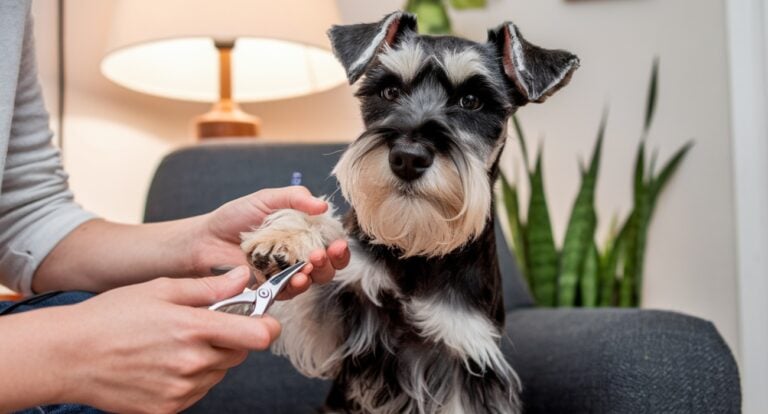Think you know everything your Mini Schnauzer needs to be happy? You might be overlooking some essential parts of their care! It’s easy to miss subtle cues that indicate your pup might need more attention in certain areas, but don’t worry—we’re here to help.
The Energetic Explorer: Exercise Needs of Mini Schnauzers
Don’t let their small size fool you – mini schnauzers are bundles of energy wrapped in a compact package. These little dynamos need regular exercise to stay happy and healthy.
A sedentary lifestyle can lead to boredom, destructive behavior, and even health issues for your mini schnauzer. Aim for at least 30 minutes to an hour of physical activity daily.
Variety is the spice of life for these curious pups. Mix up their exercise routine with walks, play sessions, and even agility training to keep them mentally stimulated.
Remember, a tired schnauzer is a good schnauzer! Regular exercise helps prevent behavioral problems and keeps their mischievous minds occupied.
Grooming Galore: Keeping Your Mini Schnauzer Looking Sharp
That adorable schnauzer ‘look’ doesn’t happen by accident – it requires consistent grooming attention. Ignoring their grooming needs can lead to discomfort and even health issues.
Brush your mini schnauzer’s coat at least 2-3 times a week to prevent matting and remove loose hair. Their wiry double coat needs regular attention to stay in top shape.
Don’t forget about those expressive eyebrows and magnificent beard! These facial features require extra care to prevent food particles from getting trapped and causing skin irritation.
Professional grooming every 6-8 weeks can help maintain the classic schnauzer look and keep your pup feeling fresh. It’s also a great opportunity for a thorough health check.
Regular nail trims are essential for your mini schnauzer’s comfort and mobility. If you hear clicking on the floor when they walk, it’s time for a trim!
Brain Games: Mental Stimulation for Your Mini Mastermind
Mini schnauzers are known for their intelligence, which means they need mental stimulation to prevent boredom and destructive behaviors.
Puzzle toys and treat-dispensing games are excellent ways to keep your mini schnauzer’s mind engaged. These activities tap into their problem-solving skills and natural curiosity.
Training sessions aren’t just for puppies! Continue to teach your adult mini schnauzer new tricks and commands to keep their minds sharp and strengthen your bond.
Consider activities that combine physical and mental exercise, like scent work or agility courses. These can be great fun for both you and your pup!
Don’t underestimate the power of socialization. Regular interactions with other dogs and people provide valuable mental stimulation for your mini schnauzer.
Chow Time: Nutrition Needs for Your Mini Schnauzer
A balanced diet is crucial for your mini schnauzer’s overall health and well-being. Ignoring their nutritional needs can lead to various health issues down the road.
Choose a high-quality dog food that’s appropriate for your mini schnauzer’s age, size, and activity level. Consult with your veterinarian to find the best option for your pup.
Be mindful of portion sizes – mini schnauzers can be prone to obesity if overfed. Follow feeding guidelines and adjust as needed based on your dog’s activity level and body condition.
Consider incorporating some healthy, dog-safe fruits and vegetables as treats. This can add variety to their diet and provide additional nutrients.
Watch out for food allergies, which can be common in mini schnauzers. If you notice any signs of digestive upset or skin issues, consult your vet about potential food sensitivities.
Health Watch: Common Mini Schnauzer Health Concerns
While generally healthy, mini schnauzers can be prone to certain health issues. Being aware of these potential problems can help you catch and address them early.
Regular veterinary check-ups are essential for monitoring your mini schnauzer’s health. Don’t skip these important appointments!
Keep an eye out for signs of dental problems, as mini schnauzers can be prone to tooth and gum issues. Regular teeth brushing and dental chews can help maintain oral health.
Be aware of the symptoms of pancreatitis, a condition that mini schnauzers are particularly susceptible to. Watch for signs like vomiting, loss of appetite, and abdominal pain.
Monitor your mini schnauzer for any signs of eye problems, including cataracts or progressive retinal atrophy, which can be more common in this breed.
Cuddle Central: Emotional Needs of Your Mini Schnauzer
Don’t forget that your mini schnauzer has emotional needs too! These affectionate dogs thrive on companionship and attention from their human family.
Spend quality time with your mini schnauzer every day. This can include playtime, training sessions, or simply snuggling on the couch.
Be mindful of separation anxiety, which can be common in this breed. Gradually accustom your pup to being alone and provide plenty of mental stimulation when you’re away.
Positive reinforcement is key when training your mini schnauzer. These smart pups respond well to praise and rewards, strengthening your bond in the process.
Create a safe, comfortable space for your mini schnauzer in your home. A cozy bed, some favorite toys, and a quiet area can provide a sense of security.
Schnauzer Social Hour: Interaction Needs for Your Pup
Mini schnauzers are social creatures who generally enjoy the company of other dogs and people. Don’t neglect their need for positive social interactions.
Expose your mini schnauzer to a variety of people, animals, and environments from an early age. This helps create a well-adjusted, confident adult dog.
Consider arranging playdates with other friendly dogs. This provides valuable social interaction and can be a great form of exercise too!
Enroll in obedience classes or training workshops. These not only improve your dog’s behavior but also offer opportunities for socialization.
Remember that every dog is an individual. While most mini schnauzers are social, respect your pup’s comfort level and never force interactions.
Bark Back: Communication is Key
Pay attention to your mini schnauzer’s body language and vocalizations. They’re constantly communicating with you, even if you don’t always understand.
Learn to recognize signs of stress or discomfort in your mini schnauzer. This can include excessive barking, hiding, or changes in body posture.
Encourage calm, quiet behavior and avoid reinforcing excessive barking. Mini schnauzers can be vocal, but consistent training can help manage this trait.
Remember that your mini schnauzer is sensitive to your emotions. They pick up on your stress or excitement, so maintain a calm, positive demeanor around your pup.
Home Sweet Home: Creating a Schnauzer-Friendly Environment
Make your home a safe and enriching place for your mini schnauzer. This includes removing potential hazards and providing appropriate toys and activities.
Ensure your mini schnauzer has access to fresh water at all times and a comfortable place to rest. A mix of soft beds and cooler surfaces gives them options.
Provide a variety of toys that cater to different play styles – chew toys, fetch toys, and puzzle toys can all have a place in your mini schnauzer’s toy box.
Consider your mini schnauzer’s size when arranging furniture and selecting accessories. Ensure they can easily access their favorite spots without risk of injury.
Loving Your Mini to the Max!
Phew! We’ve covered a lot of ground in our mini schnauzer adventure. From exercise and grooming to mental stimulation and health concerns, there’s plenty to keep in mind when caring for these charming little dogs. But don’t worry – with a little attention to their needs and a whole lot of love, you’ll have a happy, healthy mini schnauzer who thinks you’re the best human ever. So go on, give that fuzzy face a scratch and those eyebrows a trim. Your mini schnauzer will thank you with a lifetime of loyalty, laughs, and love!


